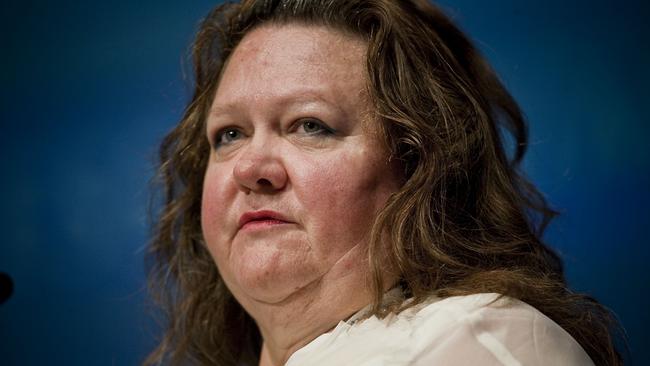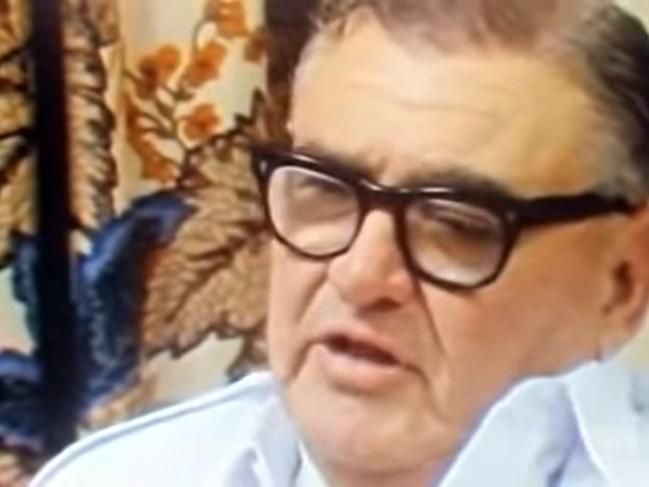Lang Hancock’s vast spending for wife Rose Porteous revealed in Gina Rinehart royalties case
Late mining magnate Lang Hancock, father of Gina Rinehart, spent “vast sums of money” belonging to his company at the behest of his then-wife, a court has heard.

Mining
Don't miss out on the headlines from Mining. Followed categories will be added to My News.
The founding father of Western Australia’s iron ore industry repeatedly and selfishly breached his fiduciary duties to his own company to benefit him and his second wife, a Perth court has heard.
Lawyer for Hancock Prospecting, Noel Hutley SC, told a mammoth civil trial in the West Australian Supreme Court that Mr Hancock shuffled tenements at the centre of the now-lucrative Hope Downs operation between his family companies, HPPL and the Hancock Family Memorial Foundation, in a bid to withdraw “vast sums of money” to fund a lavish lifestyle.
The court heard it was those actions, where Mr Hancock purchased “mansions and the like”, that led to “unfortunate difficulties” between Mr Hancock and his heir, Gina Rinehart, who he actively tried to keep company business from as she began asking questions.


“He started diverting valuable opportunities and interests of HPPL away from HPPL,” Mr Hutley said.
“That led to Mrs Rinehart … to raise questions about the conduct of HPPL, in particular, by Mr Lang Hancock.
”Lang Hancock’s response to that was to remove Mrs Rinehart from the directorship of HPPL, remove her as a member of (the foundation) and remove her as a director of (the foundation) to keep her in the dark.”
The claims bookend two days of complex evidence against claims to the Hope Downs mining fortune by the relatives of Mr Hancock’s former business partner Peter Wright, who say they are entitled to a proprietary and royalty stake in Hope Downs.
Mr Hutley argued it was the selfish acts of Mr Hancock in his later years that, in part, shut down those claims to the fortune – as well as those of his grandchildren John Hancock and Bianca Rinehart who are also party to the case.
“Lang Hancock never acted with (Wright Prospecting Pty Ltd’s) interests in mind, nor even (Hancock Prospecting Pty Ltd’s).
“(It was about) his own self interest and those of his then-wife Rose.
“There was never consent by shareholders to any of what Lang Hancock did and Lang Hancock himself came to realise shortly before his death, of the extent of his wrongdoing and commenced to undertake its reversal, but he died before that could be completed.”
“It pains us to say it was a patent breach of fiduciary duty on the part of Lang Hancock.”

In addition to the bombshell characterisation of Mr Hancock, Mr Hutley pointed to internal memos from WPPL considering whether to pursue bringing tenements in question into the partnership which he said they chose not to do, and diary entries of the now-General Manager Chris McSweeney in 2002, which he argued went further to dispute WPPL’s claims.
“That is in our respectful submission evidence which is … further devastating to anything which could conceivably be left to the claim made to East Angelas,” Mr Hutley said.
While today’s hearing spent much time discussing the self interest of Mr Hancock, which his lawyers said was “at the behest” of Ms Porteous, Mr Hutley said it was “but a short part” of a much longer career for Mr Hancock, who was devoted to developing the Pilbara.
In an apparent reference to Mrs Rinehart, Mr Hutley said his client took “no joy” in revisiting the events of the 1980s.
The Hancock party is due to complete its opening submissions for the case tomorrow, with evidence for John Hancock and Bianca Hancock set to begin next week.
The trial continues.
Originally published as Lang Hancock’s vast spending for wife Rose Porteous revealed in Gina Rinehart royalties case




